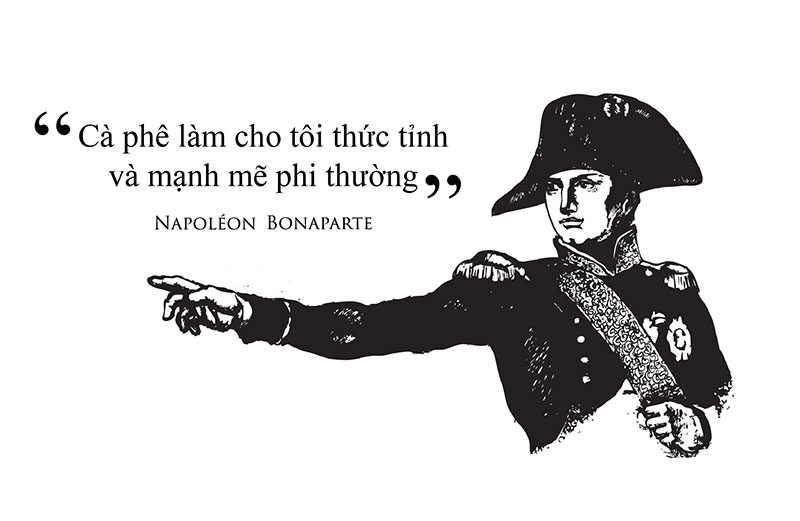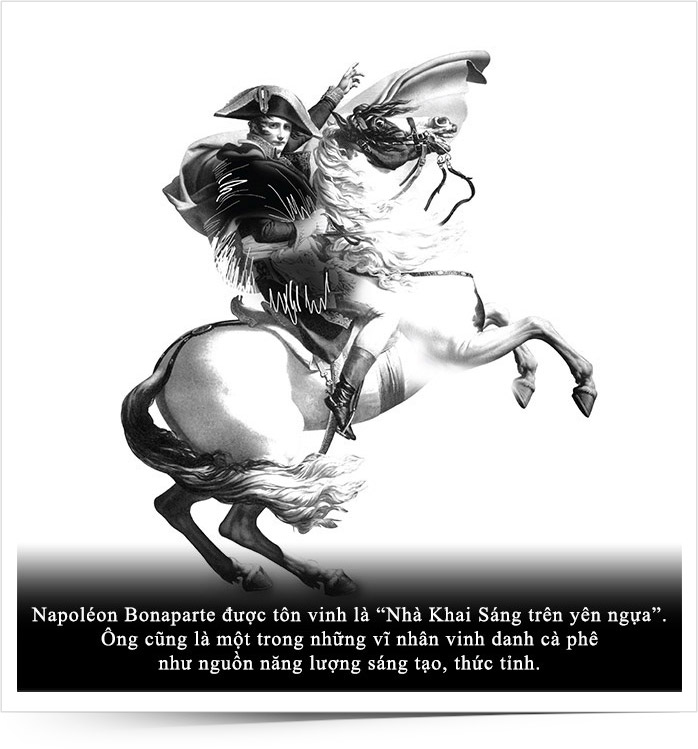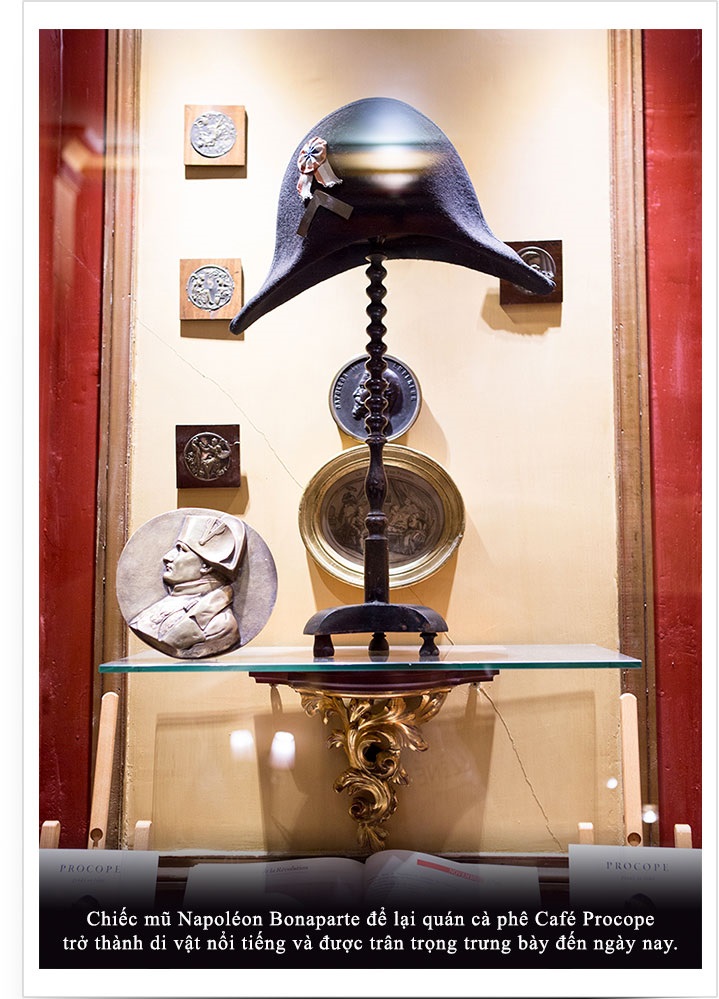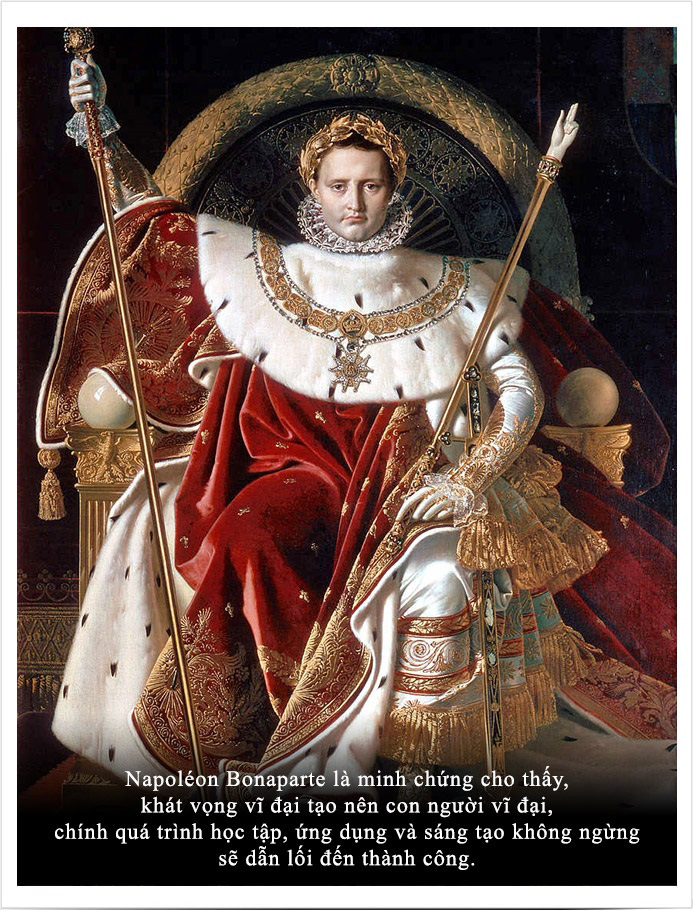Article 15: Napoleon Bonaparte: “Coffee wakes me up and makes me incredibly strong”
Napoleon Bonaparte (August 15, 1769 – May 5, 1821) was one of the most outstanding military geniuses in the history of the world. For his efforts to build a progressive society, he was honored as “The Enlightenment on horseback.”

Coffee makes me awake and extraordinarily strong – Napoléon Bonaparte
Napoleon Bonaparte was born on the small island of Corsica, constantly invaded by big countries, sold by Italy to France. The inhabitants of the island of Corsica were considered unpopular, lower than Roman slaves. The Corsicans resigned themselves to their fate of captivity and war.
But, Napoleon was completely different. Since he was a child, he showed a resilient personality, never accepting being inferior to anyone. In particular, instead of participating in games like his peers, he read books and learned biographies of great people. Reading habits strongly influenced the personality of Napoleon Bonaparte. He soon saw the social injustices, hatred, national inferiority … leading to human suffering. From that moment on he aspired to be the architect of France and to build a federation of free peoples with a radical government.
That intense desire became an infinite source of energy for Napoleon to defy all contempt, pressure of class differences, to study and train hard to join the French army. At 16, Napoleon was the first Corsican to graduate from the École Militaire.
During his time as an artilleryman, Napoleon was passionate about acquiring knowledge and learning anything he could. He studied the military art and tactical thinking of great leaders: Leonidas I (king of the warrior nation Sparta), Alexander the Great (king of the Macedonian empire, once conquered half the world), Julius Caesar (one of the greatest leaders of the Roman Empire), Marcus Porcius Cato Uticensis (famous Roman orator)…
Napoleon Bonaparte often read late into the night, sometimes early in the morning. Therefore, Napoleon’s favorite drink was coffee. Initially, he drank 2 cups of coffee in the morning and after dinner. Over time, Napoleon’s love for coffee grew and he drank coffee whenever he could. Napoleon Bonaparte believed that drinking coffee can lift the spirit, enhance concentration, intelligence, creativity, and can invigorate the physical body. Napoleon Bonaparte once said, “Coffee makes me awake and extraordinarily strong.”

Napoleon Bonaparte is honored by the French as the Man of Destiny. He is also one of the great people who honor coffee as a source of creative and awakening energy.
In fact, Napoleon Bonaparte was a brave and creative military leader with effective transformational tactics. At the age of 24, Napoleon was an artillery officer, never commanded directly on the battlefield, but took the initiative to take on an extremely risky mission: to lead troops against the alliance of Britain, Spain, Prussia, Austria, and Italy in siege of Toulon. In this naval battle, France had almost no chance of winning when facing the most powerful navy in the world at the time. Napoleon applied his military knowledge, geographical knowledge, and previously learned skills of persuasion, drawing up a perfect battle plan, quickly defeating a much stronger alliance.
The Battle of Toulon began a series of battles that completely changed European history, including classic battles such as Austerlitz (1805) conquering the Russian-Austrian alliance, the Italian Campaign (1796-1797), the expedition conquest of Egypt (1798-1799), the battle of Jena-Auerstedt (1806) defeated Prussia – one of the four largest empires in the world at that time…
Napoleon’s creative tactics made an important contribution to the formation and development of military science, laying the foundation for modern military doctrine. At the same time, it brought Napoleon to the top of politics. At the age of 35, Napoleon was crowned Emperor of France, crowned King of Italy, Lord of the Confederation of the Rhine.

The hat Napoleon Bonaparte left behind at Café Procope has become a famous relic, has been treasured and displayed to this day.
During the years of war, Napoleon always aspired to build a progressive society. Napoleon often went to Café Procope – a meeting place for contemporary enlightened intellectuals such as Voltaire, Diderot, Rousseau, D’Alembert… Here, he approached the progressive ideals of charity, tolerance, brotherhood, aspiration for a constitutional government…
Based on the enlightenment doctrines approached from the cafe, Napoleon implemented a series of reforms that changed France and Europe. Napoleon was the first European emperor to implement a policy of religious harmony, promulgating the Napoleonic Code to expand human rights.
In particular, Napoleon clearly recognized the importance of education in the construction of a new society. He said that the present and the future both depend on education, must forge a generation of active citizens “with the right mindset”. Napoleon brought together scientists to research and recalibrate the educational system from primary school to university level. He built public schools and established a system of special education schools such as École Normale Supérieure, École Polytechnique, Grandes Écoles, research institutes… In his speech to admit students to the French Academy in 1797, Napoleon emphasized “The real strength of the French Republic lies in the fact that any new thought must belong to us.”
These schools have trained talent for the military, industrial and administrative sectors of France. By the 19th century, a new class of people had formed with applied scientific initiatives to help France become a powerful country, influencing all over Europe, Paris developed to become the center of Western civilization.

Napoleon Bonaparte is a proof that great aspirations create great people, it is the process of constant learning, application and creativity that will lead to success.
Historian Andrew Roberts has called Napoleon Bonaparte “The Enlightenment on horseback”, he brought freedom, the spirit of national liberation to the lands he conquered. His reforms were “revolutionary projects” that encouraged progressive social development, accelerated the end of feudalism, and established nationalism… It was this spirit which created a French national unity bloc, reinforcing national ideals in Germany, Italy, the Netherlands, Switzerland…
Researchers all think that Napoleon Bonaparte was an outstanding military and political man, one of the great men who changed world history. Those extreme successes are achieved through a continuous process of learning and creativity. Napoleon Bonaparte was the person who applied, created and perfected the theories and ideas of influential historical figures. In his military tactics are the silhouettes of Alexander the Great, Julius Caesar… In his social reforms there are Voltaire’s religious liberal ideas and Rousseau’s “Social Contract”. In the Napoleonic Code that affected the world’s civil law system was the thought of the French Revolution and the Roman Law…
Napoleon Bonaparte is proof that one person from the tiny island of Corsica can change the world. It is great aspiration that creates a great person, it is the process of constant learning, application and creation that will lead to success.
*Coming up: The Philosopher Voltaire and the Coffee Enlightenment


